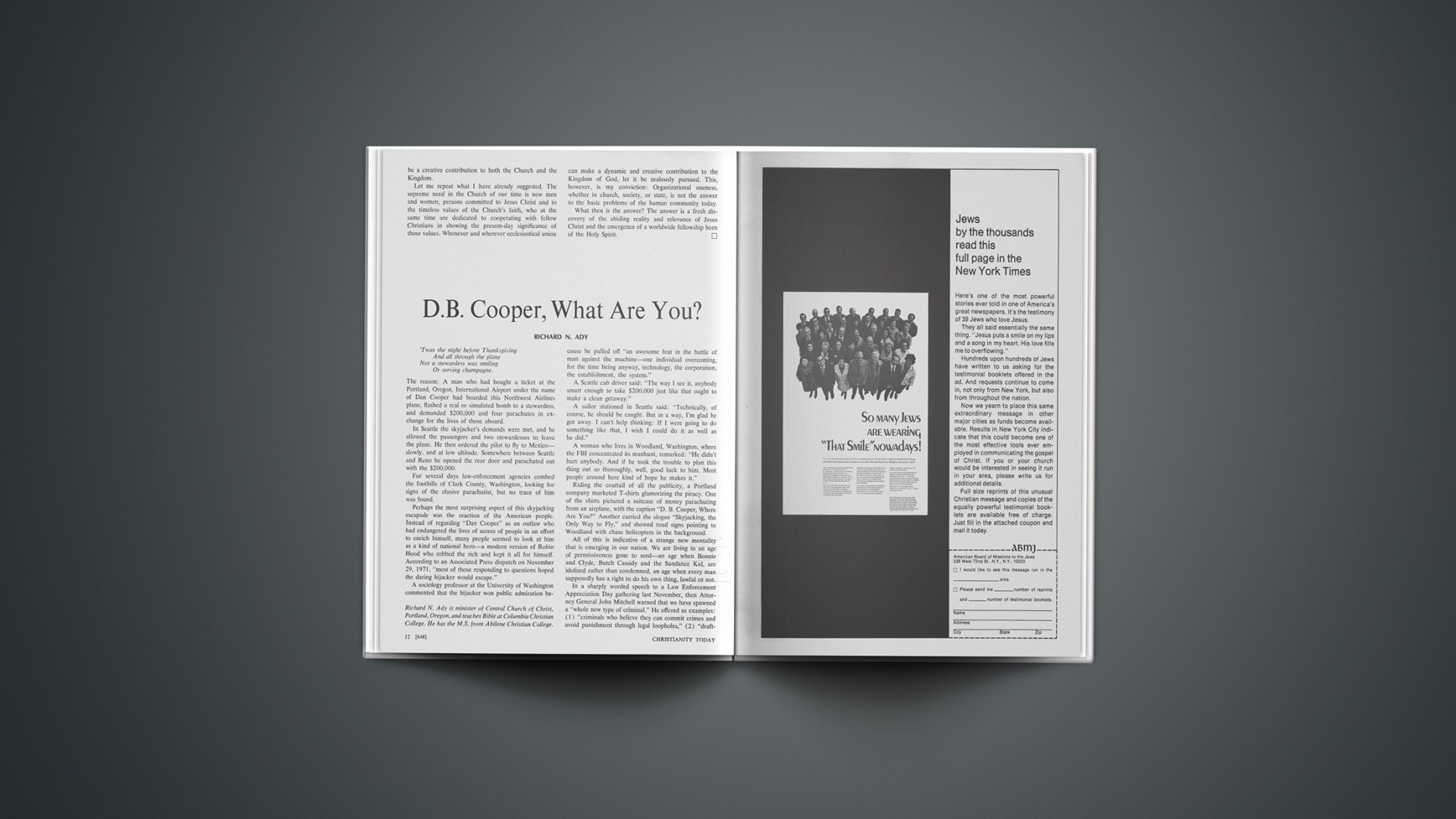’Twas the night before Thanksgiving
And all through the plane
Not a stewardess was smiling
Or serving champagne.
The reason: A man who had bought a ticket at the Portland, Oregon, International Airport under the name of Dan Cooper had boarded this Northwest Airlines plane, flashed a real or simulated bomb to a stewardess, and demanded $200,000 and four parachutes in exchange for the lives of those aboard.
In Seattle the skyjacker’s demands were met, and he allowed the passengers and two stewardesses to leave the plane. He then ordered the pilot to fly to Mexico—slowly, and at low altitude. Somewhere between Seattle and Reno he opened the rear door and parachuted out with the $200,000.
For several days law-enforcement agencies combed the foothills of Clark County, Washington, looking for signs of the elusive parachutist, but no trace of him was found.
Perhaps the most surprising aspect of this skyjacking escapade was the reaction of the American people. Instead of regarding “Dan Cooper” as an outlaw who had endangered the lives of scores of people in an effort to enrich himself, many people seemed to look at him as a kind of national hero—a modern version of Robin Hood who robbed the rich and kept it all for himself. According to an Associated Press dispatch on November 29, 1971, “most of those responding to questions hoped the daring hijacker would escape.”
A sociology professor at the University of Washington commented that the hijacker won public admiration because he pulled off “an awesome feat in the battle of man against the machine—one individual overcoming, for the time being anyway, technology, the corporation, the establishment, the system.”
A Seattle cab driver said: “The way I see it, anybody smart enough to take $200,000 just like that ought to make a clean getaway.”
A sailor stationed in Seattle said: “Technically, of course, he should be caught. But in a way, I’m glad he got away. I can’t help thinking: If I were going to do something like that, I wish I could do it as well as he did.”
A woman who lives in Woodland, Washington, where the FBI concentrated its manhunt, remarked: “He didn’t hurt anybody. And if he took the trouble to plan this thing out so thoroughly, well, good luck to him. Most people around here kind of hope he makes it.”
Riding the coattail of all the publicity, a Portland company marketed T-shirts glamorizing the piracy. One of the shirts pictured a suitcase of money parachuting from an airplane, with the caption “D. B. Cooper, Where Are You?” Another carried the slogan “Skyjacking, the Only Way to Fly,” and showed road signs pointing to Woodland with chase helicopters in the background.
All of this is indicative of a strange new mentality that is emerging in our nation. We are living in an age of permissiveness gone to seed—an age when Bonnie and Clyde, Butch Cassidy and the Sundance Kid, are idolized rather than condemned, an age when every man supposedly has a right to do his own thing, lawful or not.
In a sharply worded speech to a Law Enforcement Appreciation Day gathering last November, then Attorney General John Mitchell warned that we have spawned a “whole new type of criminal.” He offered as examples: (1) “criminals who believe they can commit crimes and avoid punishment through legal loopholes,” (2) “draft-dodgers in Canada who renounce their citizenship but believe they can return to the United States as though nothing had happened,” (3) “rioters who believe they can do violence and escape arrest,” (4) “revolutionaries who think they can commit murder and other crimes and stay out of jail by crying ‘political prisoner!’ ”
A few weeks later Howard Post echoed Mitchell’s charges in his syndicated comic strip “The Dropouts.” The first frame shows the little dropout standing outside the barred window of a jail talking to a tough-looking character inside. “What are you in for, Virgil?” asked the dropout.
“I am detained as a political prisoner,” came the reply, “merely because the chief and I do not share the same beliefs.”
“What do you believe in?” asked the dropout.
“Theft,” said the prisoner with a smile.
We are living in a world cut loose from its moorings and drifting in circles, a world in which evil men are called good and the “good guys” are called “pigs.” The Prophet Isaiah addressed himself to a generation much like our own. Speaking for God he warned: “Woe to those who call evil good and good evil, who put darkness for light and light for darkness, who put bitter for sweet and sweet for bitter.”
It is entirely possible for well-meaning Christians to be caught in the riptide of popular thinking. Not even evangelists and church leaders are immune to the subtle influences of permissive psychology. We may, if we are not careful, find ourselves sympathizing with some forms of evil and even looking upon them with half-hearted admiration. No matter how cleverly or dramatically a crime is committed, it is still a crime, and the Scriptures continue to admonish us to “abhor that which is evil.”
Richard N. Ady is minister of Central Church of Christ, Portland, Oregon, and teaches Bible at Columbia Christian College. He has the M.S. from Abilene Christian College.










